Related Research Articles

Scottish Gaelic, also known as Scots Gaelic or simply Gaelic, is a Goidelic language native to the Gaels of Scotland. As a Goidelic language, Scottish Gaelic, as well as both Irish and Manx, developed out of Old Irish, and it remains, to a degree, mutually intelligible with Irish. It became a distinct spoken language sometime in the 13th century in the Middle Irish period, although a common literary language was shared by the Gaels of both Ireland and Scotland until well into the 17th century. Most of modern Scotland was once Gaelic-speaking, as evidenced especially by Gaelic-language place names.
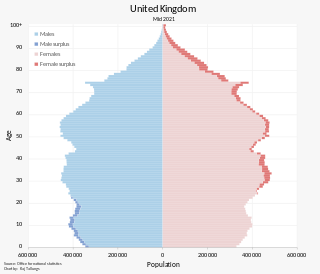
The population of the United Kingdom was estimated at 67,596,281 in 2022. It is the 21st most populated country in the world and has a population density of 279 people per square kilometre, with England having significantly greater density than Wales, Scotland, and Northern Ireland. Almost a third of the population lives in south east England, which is predominantly urban and suburban, with 8,866,180 people in the capital city, London, whose population density was 5,640 inhabitants per square kilometre (14,600/sq mi) in 2022.
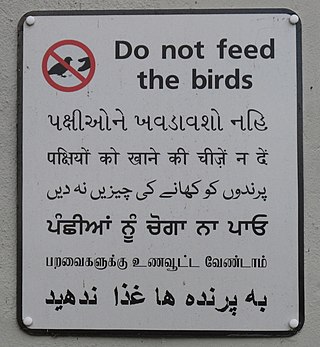
English is the most widely spoken and de facto official language of the United Kingdom. A number of regional and migrant languages are also spoken. Regional English variant languages include Scots and Ulster Scots, and indigenous Celtic languages include Irish, Scottish Gaelic, and Welsh. There are many non-native languages spoken by immigrants, including Polish, Hindi, and Urdu. British Sign Language is sometimes used as well as liturgical and hobby languages such as Latin and a revived form of Cornish.
Christianity is the dominant religion in the United Kingdom. Results of the 2021 Census for England and Wales showed that Christianity is the largest religion, followed by the non-religious, Islam, Hinduism, Sikhism, Judaism, Buddhism, and Taoism. Among Christians, Anglicanism is the most common denomination, followed by Catholicism, Presbyterianism, Methodism, Unitarianism, and Baptism. Results for the 2022 census in Scotland showed that 38.8% of the Scottish population identified as Christian, with 20.4% stating that the Church of Scotland is their main religion, whilst 13.3% stated their main religion was the Catholic church in Scotland.
The United Kingdom Census 1901 was the 11th nationwide census conducted in the United Kingdom of Great Britain and Ireland, and was done on 31 March 1901 "relating to the persons returned as living at midnight on Sunday, March 31st".
A one-name study is a project researching a specific surname, as opposed to a particular pedigree or descendancy. Some people who research a specific surname may restrict their research geographically and chronologically, perhaps to one country and time period, while others may collect all occurrences world-wide for all time.
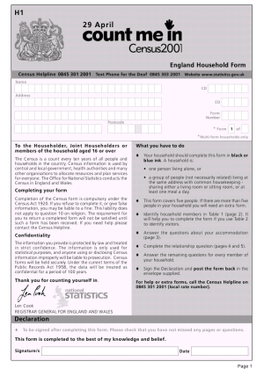
Coincident full censuses have taken place in the different jurisdictions of the United Kingdom every ten years since 1801, with the exceptions of 1941, Ireland in 1921/Northern Ireland in 1931, and Scotland in 2021. In addition to providing detailed information about national demographics, the results of the census play an important part in the calculation of resource allocation to regional and local service providers by the UK government.

The Manx are an ethnic group originating on the Isle of Man, in the Irish Sea in Northern Europe. They belong to the diaspora of the Gaelic ethnolinguistic group, which now populate the parts of the British Isles which once were the Kingdom of the Isles and Dál Riata. The Manx are governed through the Tynwald, the legislature of the island, which was introduced by Viking settlers over a thousand years ago. The native mythology and folklores of the Manx belong to the overall Celtic Mythology group, with Manannán mac Lir, the Mooinjer veggey, Buggane, Lhiannan-Shee, Ben-Varrey and the Moddey Dhoo being prominent mythological figures on the island. Their language, Manx Gaelic is derived from Middle Irish, which was introduced by settlers that colonised the island from Gaelic Ireland. However, Manx gaelic later developed in isolation and belongs as a separate Goidelic language of the Insular Celtic languages.

The Census Act 1800 – also known as the Population Act 1800 – was an Act of the Parliament of Great Britain which enabled the first Census of England, Scotland and Wales to be undertaken. The census was carried out in 1801 and has been repeated almost every ten years thereafter. The 1801 census estimated the population of England and Wales to be 8.9 million, and that of Scotland was 1.6 million. Ireland was not included in the census until 1821.
The United Kingdom Census of 1851 recorded the people residing in every household on the night of Sunday 30 March 1851, and was the second of the UK censuses to include details of household members. However, this census added considerably to the fields recorded in the earlier 1841 UK Census, providing additional details of ages, relationships and origins, making the 1851 census a rich source of information for both demographers and genealogists.
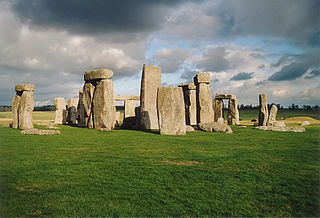
The Modern Pagan movement in the United Kingdom is primarily represented by Wicca and Neopagan witchcraft, Druidry, and Heathenry. 74,631 people in England, Scotland and Wales identified as either as Pagan or a member of a specific Modern Pagan group in the 2011 UK Census.

The National Registration Act 1939 was an Act of Parliament in the United Kingdom. The initial National Registration Bill was introduced to Parliament as an emergency measure at the start of the Second World War.

Whitgreave is a very small village a few miles to the NNW of Stafford situated midway between the M6 motorway to the west and the A34 trunk road to the east.

Surnames originating on the Isle of Man reflect the recorded history of the island, which can be divided into three different eras — Gaelic, Norse, and English. In consequence most Manx surnames are derived from the Gaelic or Norse languages.
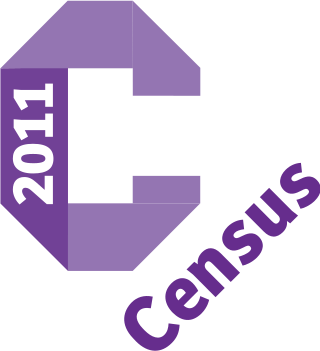
A census of the population of the United Kingdom is taken every ten years. The 2011 census was held in all counties of the UK on 27 March 2011. It was the first UK census which could be completed online via the Internet. The Office for National Statistics (ONS) is responsible for the census in England and Wales, the General Register Office for Scotland (GROS) is responsible for the census in Scotland, and the Northern Ireland Statistics and Research Agency (NISRA) is responsible for the census in Northern Ireland.
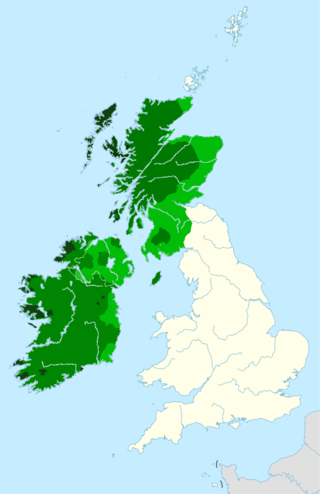
The Gaels are an ethnolinguistic group native to Ireland, Scotland and the Isle of Man. They are associated with the Gaelic languages: a branch of the Celtic languages comprising Irish, Manx and Scottish Gaelic.
Claude Martin Blagden was an eminent Anglican bishop in the first half of the 20th century.

The Scottish people or Scots are an ethnic group and nation native to Scotland. Historically, they emerged in the early Middle Ages from an amalgamation of two Celtic peoples, the Picts and Gaels, who founded the Kingdom of Scotland in the 9th century. In the following two centuries, Celtic-speaking Cumbrians of Strathclyde and Germanic-speaking Angles of Northumbria became part of Scotland. In the High Middle Ages, during the 12th-century Davidian Revolution, small numbers of Norman nobles migrated to the Lowlands. In the 13th century, the Norse-Gaels of the Western Isles became part of Scotland, followed by the Norse of the Northern Isles in the 15th century.

The 2021 United Kingdom census is the 23rd official census of the United Kingdom. Beginning in 1801, they have been recorded every 10 years. The 2021 censuses of England, Wales, and Northern Ireland took place on 21 March 2021, and the census of Scotland took place 364 days later on 20 March 2022. The censuses were administered by the Office for National Statistics (ONS) in England and Wales, by the Northern Ireland Statistics and Research Agency (NISRA) in Northern Ireland, and by the National Records of Scotland in Scotland. These were the first British censuses for which most of the data was gathered online. Two of them went ahead despite the COVID-19 pandemic, in part because the information obtained would assist government and public understanding of the pandemic's impact. The census-taking in Scotland was postponed, and took place in 2022 because of the pandemic.
The United Kingdom Census 1921 was a census of the United Kingdom of Great Britain and Ireland that was carried out on 19 June 1921. It was postponed for two months from April due to industrial unrest and no census was taken in Ireland due to the Irish War of Independence. It was the first census in the UK to ask about place of work and industry, and whether a marriage had been dissolved by divorce.
References
- ↑ "Census records". The National Archives. Retrieved 7 March 2018.
- ↑ 1801-1901. Office for National Statistics. Archived by The National Archives 28 January 2016. Retrieved 13 July 2017.
- ↑ "1881 England, Wales & Scotland Census". FindMyPast. Retrieved 15 December 2021.
- ↑ "Pages from 1881 census go online". BBC News. 3 December 2004. Retrieved 24 November 2012.
- ↑ Woollard, M; Schurer, K (9 Nov 2000). "1881 Census for England and Wales, the Channel Islands and the Isle of Man (Enhanced Version)". UK Data Service. doi:10.5255/UKDA-SN-4177-1 . Retrieved 14 February 2020.
- ↑ "Federation Wiki". Federation of Family History Societies. Retrieved 14 February 2020.
- ↑ Young, Stephen; Lumas, Susan (1995). "History Of The British 1881 Census Project". The Federation of Family History Societies. Archived from the original on 2005-01-01. Retrieved 14 February 2020.
- ↑ "National index to 1881 British census". FamilySearch. Retrieved 14 February 2020.
- ↑ Christian, Peter; Annal, David (2014). Census. The Family Historian's Guide. London: Bloomsbury. p. 116. ISBN 978-1-4729-0293-1.
- ↑ "1881 Census". National Records of Scotland. Retrieved 11 July 2023.
- ↑ "Return of numbers of gaelic-speaking people of Scotland, under census of 1881". histpop. Retrieved 11 July 2023.